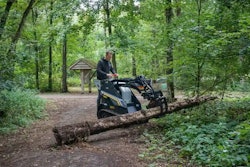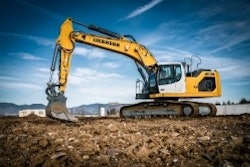There was a time when traveling around the country building golf courses was fun work for Andy Smith. Raised on a tobacco farm in North Carolina, Smith grew up working on and around power equipment but figured out early in life farming was essentially a break-even proposition.
Working in various real estate sales and development jobs was profitable, but unfulfilling. “I was selling real estate on this golf course being built and slowly began to take a more active role in the actual construction of the course,” Smith recalls. Hurricane Hugo had blown through South Carolina and Smith helped the construction crew clean up and rush to meet its completion deadline in the aftermath of the storm.
“I realized I missed being outside,” he says, “and really enjoyed the idea of seeing a project through from beginning to end and changing the landscape to meet a developer’s vision. Moreover, there was a level of satisfaction in this work that I’d never felt before.”
Fired up by his new calling, Smith quit his job and went to work for Landscapes Unlimited out of Lincoln, Nebraska, running a crew building golf courses all over the United States. “I’d stay somewhere three months to a year, building courses,” he recalls. “I did that for seven years and learned a lot, including the growing importance of erosion control on these jobs. New government regulations were coming down the pike all the time and we were always scrambling to meet them with new tools and technologies.”
As much as he enjoyed building golf courses, over time Smith began to feel the desire to own his own business. He was winding up work on a golf course in Raleigh when a friend asked him if he was interested in speaking to an acquaintance about a business opportunity. The timing was perfect. Although he’d decided to leave the golf course business, he wasn’t sure what he wanted to do yet.
Seizing an opportunity
So Smith met Clayton Phillis. A Pennsylvania native and graduate of Penn State University, Phillis had worked for a well-digging company after finishing school. “I was one of those kids who was always fascinated by construction work,” he says, “and knew I didn’t want to spend my life working indoors.” Like Smith, Phillis wanted his own business.
Phillis started out in North Carolina working for a landscape company. He soon became friends with his boss, and the two of them starting talking about businesses they could start together. Then, a salesman visited to demo a hydro-seeding machine. “We looked at it and realized nobody in Raleigh was using them. All the other environmental contractors were using straw seeders. But this unit mixes wood mulch, fertilizer and seed together before spraying it outward in a thick cover with better retention.”
Phillis’ boss sold his lawn care business and the two partners pooled $13,000 to buy a hydro-seeder and founded EcoTurf. “It was just the two of us,” Phillis remembers. “Our wives – who both worked – were really supporting us in the beginning.”
But after only six months, EcoTurf was so busy Phillis and his partner bought a second hydro seeder and began hiring additional workers. “We did $200,000 that first year,” Phillis recalls fondly, “and thought we were on top of the world.”
They’d also made valuable contacts with several homebuilding contractors. “We were starting to get work as subcontractors on housing developments in the area,” Phillis says. “And these contractors asked us to start laying silt fence on their jobs. So we started experimenting, and today silt fencing is probably our No. 1 subcontracted service.”
As the business grew, Phillis’ partner decided to branch out and begin selling erosion control supplies to other contractors in the Raleigh area (Phillis owns a stake in that company as well). “He knew Andy, and thought he’d be the perfect guy to run EcoTurf while the supply company was getting off the ground,” Phillis says.
So a deal was struck. Smith would take over EcoTurf’s field operations. Phillis would handle the office work and help found the erosion supply company. Once EcoTurf reached a certain revenue number, Smith would be brought in as a partner in the business. “I don’t know if we ever reached that figure,” Phillis says with a laugh. “But we liked Andy and brought him onboard anyway.”
BNR’s tips for beginning contractors
- Pay attention to the details. Know the entire scope of operations.
- Be careful whom you work for.
- Know how to lien projects properly and what your lien rights are.
- Just because you’re making a profit, doesn’t mean it’s time to take the profit out of the business. Put it back in until the company’s strong enough to stay strong.
- Buy machines, not toys.
- Get a computer system that’s structured for your operation.
- Know where you are with your job costs and materials.
- Find a good bank and be honest with the people there.
- Treat your employees as key ingredients to your company’s growth.
Repeat business key to growth
That’s not to say Smith wasn’t successful growing EcoTurf. Today the company has annual revenues of around $1.6 million and employs approximately 20 workers. “General contractors and grading contractors subcontract their erosion control work, and we take care of the project basin, install silt fence, all the grass seeding and do any environmental protection work,” Smith says. “About 95 percent of our business is repeat. I haven’t sold a job in over a year. When we first started we were stopping at every jobsite we saw trying to get work. But for the past two years it’s just kind of been on autopilot.”
Both Smith and Phillis say that’s because they’ve always done what they say they’re going to do and always try to treat both their customers and their employees right. “We don’t like turnover because we view our employees as family,” Phillis adds. “We give them good hours, good insurance and a say-so in how the work is done. They work really hard for us and let us know when a new guy isn’t working out, or a job is proving to be more difficult than we anticipated.”
An expanding fleet demands operational changes
EcoTurf is highly dependent on rental equipment to be successful. The company maintains a core fleet of ag tractors, a compact backhoe and a fleet of medium-duty trucks on which its seeders and spreaders are mounted. “We like buying new equipment, especially trucks, and started purchasing brand-new equipment as soon as we could,” Smith says. “We’re in the market for either a skid steer or a compact utility loader (we still haven’t decided which) and a trencher now. We’ve been renting them, but the usage rate is getting so high we think it’s time to buy.”
As the company grows, Smith and Phillis are making other changes as well. “We just hired a technician to get our shop squared away and handle our maintenance needs. I’m a real stickler for preventive maintenance and require our guys to check out their trucks and their equipment regularly. But our new technician will be able to take some of those responsibilities off of them and let them concentrate on the operating end a bit more.”
“I think we’ve hit not just our niche, but also a solid formula for controlled growth,” Phillis adds. “As much as Andy and I enjoy being successful, neither of us wants to try and run a huge company. Spending time with our families and playing golf together are important too.”







